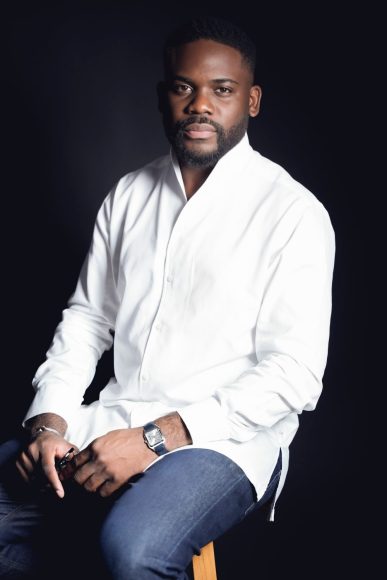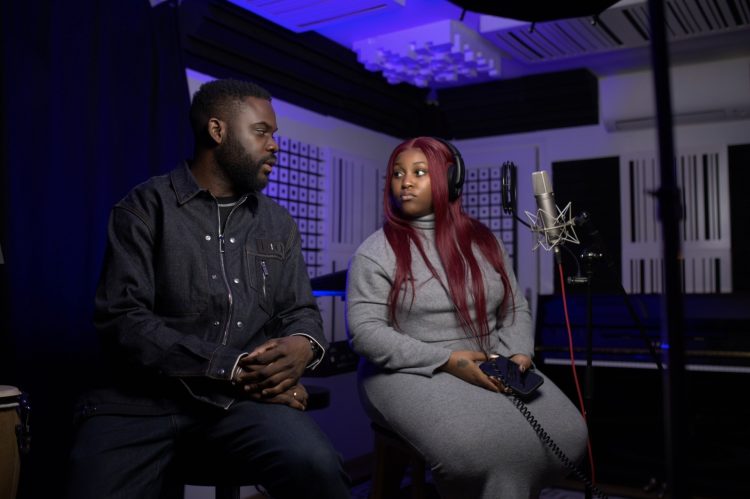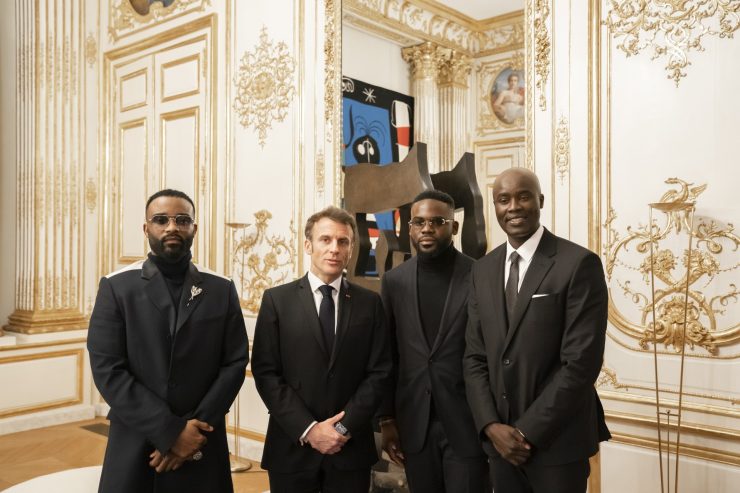For Forbes FranceElvis Adidiema analyzes how the explosion of African influence is changing the cards of the international and francophone music industry.
Today, the music industry is witnessing Africa shifting its focus. Artists from the continent are leading international careers (Burn Boy, Rema, etc.) and from now on, we are also marking a milestone here (Beyoncé, Pharrell Williams, etc.). Big companies have understood this well by establishing themselves there as well, such as the giant Sony, which entrusted Elvis Adidiem with general management at the level of Francophone Africa. A visionary music-loving entrepreneur who always believed that Stream would change the game. Looking alongside the President of the Republic Emmanuel Macron during his African tour, the Franco-Congolese accepted Forbes to return to the challenges of this market with the influence of Francophonie included in it.
Forbes France: How does this ecosystem capable of giving birth to big names work?
Elvis Adidiema : Africa is really attracting all eyes at the moment and it makes sense given the energy and creativity that radiates to the four corners of the continent. Personally, I have always felt that it was only a matter of time before the influence of African culture was felt on an international level. I definitely think that globalization, digital technology and especially streaming have helped to popularize the works of top African artists and have had an immediate impact. Several recent music projects show the quintessence of African art and its arrival. Today, Burna, Wizkid and other Temos have nothing to envy their counterparts across the Atlantic, and that is already a very big victory!
The aim is to identify these artists as early as possible to highlight their know-how and help them develop the widest possible audience. Whether in the field of art, music or sports, we can clearly see that it is a continent bursting with talent!
Your vision led you to a large company, Sony, which established itself in Africa. What is your plan as General Manager of Sony Music French-speaking Africa?
Sony Music French-speaking Africa is here to help artists understand how to work on their image, communicate on social media and ultimately how to allow their music to reach a wide audience. The music industry market in Francophone Africa is in the process of structuring and has not yet gained the weight of its English-speaking counterpart. However, its potential is very wide and thanks to the daily work of all stakeholders, including Sony Music French-speaking Africa, significant progress has been made. Which allowed us to discover new stars of the music scene. It is therefore a great pride to see the success of Emma in Gabon, RJ Kanierra in the Democratic Republic of the Congo or Roseline Layo in the Ivory Coast: these are the new stars of tomorrow and we are pleased to have their signature on our brand. .

As a music-loving entrepreneur, how exactly do you instinctively spot a new music star?
Paradoxically, this mission is quite difficult, especially for a music lover like me! I spend my days listening to music and it ranges from Amy Winehouse to Fally Ipupu, including Gazo and Lene Marlin. It actually requires taking a step back because as a label director I have to listen to the market first and foremost. Music today is no longer just a question of talent, you have to be able to offer a universe, a narrative and create a strong bond with your audience, an artist has to have several strings to stand out in an increasingly competitive market: we are talking about 120,000 daily outputs on DSP! (NODLR, Demand Side Platforms, platforms for purchasing music).
It is also important to listen to streaming platforms and social networks, because this is the primary territory of expression of artists and their fans, it is where we measure the work we develop with our artists, the reception that is reserved for their projects. .
What are the current challenges in the Stream era?
We have to introduce a new way of consumption for the population that is completely in tune with the times. Africa is lucky to have a young population, we are talking about more than 400 million people between the ages of 15 and 35, connected and above all with a real taste for music. We therefore need to find ways to create offers tailored to the markets we cover, that is, taking into account the reality of a young Congolese student who is interested in RAP music and who would just as much like to listen to the latest track from Paterne Maestro than the latest popular rapper in United States. This is where we need to focus together with industry to work together on these issues.
SIMA, the first exhibition for the African music industry – which took place a few months ago in Abidjan – allowed us to lay the first foundations to reflect on this question and it is clear that things are moving in the right direction. the recent merger between Spotify and Orange in Africa, which will give access to more than 100 million titles to the people of the Democratic Republic of the Congo (DRC), Guinea, Madagascar and Mali, is a big step for our industry.
Elvis Adidiema: “Music today is no longer just a matter of talent, you have to be able to offer a universe, a narrative and create a strong bond with the audience, especially through social media. It is one of the most competitive markets: we are talking about 120,000 releases per day on DSP! (platforms for purchasing music).”
Did the general public understand before experts, professional journalists, that the African creative industry is pluralistic with several trends? Institutions like Les Victoires de la Musique are still slow to reward francophone artists from the continent… There are many slanders that condemn this, such as the lack of representation at the Oscars and Golden Globes.
The public is aware of the continent’s musical wealth, moreover, we are talking about “African” cultures. There are many musical trends, from: coupé offset to ndombolo, including Mbalax. Unfortunately, the categories proposed by most institutions do not take this diversity into account and this naturally reduces the chances of our artists winning some prestigious prizes. But I observe that locally some ceremonies are starting to be very well attended like PRIMUD, AFRIMMA or TRACE AWARDS very recently, maybe we are talking about the African GRAMMYs like what is done in South America. The more structured we are, the more weight we will have in questions of representativeness during these high masses.
Behind this economy are real interests linked to Francophonie. It is in this context that you heard the President of the Republic, Emmanuel Macron, during his African tour last March. What was on the agenda? Are we to understand this as the realization of cooperation?
During this African tour, culture was in the spotlight, creative initiatives and the actors behind them had the opportunity to explain their approaches and their ambitions. It is this logic that led me to take part in this sequence, myself, a young person of Congolese origin, born in France and a lover of African culture and music. It was very symbolically powerful. Culture has always played a key role in international relations, and given its vitality, it is therefore natural that Africa is the center of attention. One of the main topics of my discussions with the President of the Republic, Emmanuel Macron, focused on our shared affection to support the ICC: Cultural Creative Industries, which form the anchor point of the dynamism carried by the African youth.
We must also remember that there has always been a strong dialogue between Francophone Africa and France, especially in the area of musical circulation. Today with digital the boundaries are erased and the public listens to many genres of music.
Let’s look at the French Afro-descendants: they are young, they grew up between France and Africa of their parents. They fully embrace their dual heritage and redefine the fusion of musical genres. Take an artist like Gradur, his compilation project 100% Kongo is great because it is the very expression of the influence of this legendary music on this new generation, which is at the top of the charts in France.
Your business journey is ultimately a man’s commitment to promoting Congolese culture, then pan-African culture. What were the biggest challenges of this project?
Entrepreneurship is an adventure that can be difficult but it is educational, especially when you are doing business in Africa. We have to put everything into perspective, adapt to African realities, break away from clichés that we can perpetuate without realizing it. When I made the documentary about Papa Wemba’s life, I had an unforgettable adventure that allowed me to meet extraordinary people, spend two months totally immersed in the DRC, and this confirmed my desire to maintain a strong bond with my country and with Africa.

My journey as an Afro-entrepreneur continues to serve me today as Sony Music Director of French-speaking Africa, enriching my thoughts and my interactions with all stakeholders in this market. It’s an adventure I wish everyone, because we inevitably get something out of it.
Also Read: “Large Format Interview | Aya Nakamura, the exaggerated woman: “I decided not to do anything for money”

